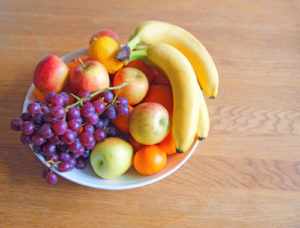Family Nutrition
There is no denying that good nutrition is one of the most important things we can give our children. Good nutrition means sanitization when preparing foods and contactless food preparation to keep people safe.
A healthy, balanced diet full of good nutrition is the backbone to supporting their growth, education and happiness.
However, ensuring your little ones get their 5-a-day can be exhausting and a challenge to say the least so how exactly do you ensure your children get the best nutrition during their early years and how do you ensure they continue to make the right nutritional choices when they become too old to be spoon fed by you?
Take a look at some of my top family nutrition tips below.
Set an Example
Children love to copy their parents so it is important that both parents are on the same wavelength when it comes to setting a nutritional example for your children.
Cut back on the junk food and fizzy drinks, eat the same meals as they do, if you can and all sit down together, tucking into your greens.
Involve the Kids
Involving children in the preparation of dishes they may initially dislike is an excellent approach to expand their palate and encourage healthier eating habits. Making the cooking process a fun and educational experience can pique their interest and make them more receptive to trying new foods.
For instance, if your child isn’t fond of Bone Broth soup, which is rich in nutrients like calcium and magnesium, you can engage them by having them participate in gathering the necessary ingredients or even sharing intriguing facts about the benefits of a bone broth diet. This approach can make them more curious and willing to give the dish a try.
Likewise, for vegetables like broccoli, involving your child in the selection and preparation process can be beneficial. They can help pick out fresh broccoli at the store, assist in washing and cutting it, and learn about the various vitamins and minerals it contains. Understanding the nutritional advantages of such foods can motivate them to adopt new foods and broaden their culinary preferences.

Breakfast is the most important meal of the day
Breakfast serves as the essential kickstart to the day. It replenishes the body’s energy levels, providing the necessary fuel for both physical and mental activities. When considering breakfast options, variety is key. Whether you’re preparing a banana bread recipe with self rising flour or whipping up a batch of pancakes served with honey and fresh fruits, these breakfast choices can be both nutritious and delightful. Keep in mind that breakfast is a non-negotiable meal that sets the tone for a productive and healthy day. Therefore, ensuring that your family has the opportunity to enjoy a nutritious and diverse breakfast each morning is a valuable investment in their long-term well-being.
Eat Slowly
Understanding the body’s signals and fostering mindful eating habits is crucial for maintaining a healthy relationship with food. It takes approximately 20 minutes for the brain to register the sensation of fullness. Encouraging both yourself and your children to eat slowly allows this natural process to unfold, preventing overeating and promoting better digestion. When we eat quickly, it’s easy to override the body’s signals and consume more calories than necessary.
Properly chewing food is another integral aspect of mindful eating. Thoroughly chewing each bite aids in the digestion process, making it easier for the body to absorb nutrients and derive maximum benefit from the ingested food. Beyond the physiological aspects, slowing down and savoring each bite fosters a greater appreciation for the flavors and textures of the meal, enhancing the overall dining experience. By instilling these habits, you contribute to the well-being of yourself and your family, promoting a healthier approach to food consumption.
Healthy Lunch Box
There is no use in upholding good nutritional values and practices at home if you send your child to school with a poorly packed lunch.
There are many alternative lunch box ideas from stir fry to wholemeal wraps, it doesn’t have too boring sandwiches and bad snacks. Avoid bad snacks such as crisps, chocolate, and fizzy drinks and replace them with water, fruit, and raw veg humous.
It can be difficult to ensure your child eats well, especially as they become older and make their own food choices but with a little encouragement and by setting a good example it can be achieved.
Make Use of Supplements
Supplements play a pivotal role in upholding the health and well-being of family members across diverse age groups. In the case of children and adolescents, supplements enriched with essential vitamins and minerals contribute significantly to their overall growth and development. Crucial nutrients such as calcium and vitamin D become imperative for bone health, while omega-3 fatty acids support cognitive function. Moreover, children with specific dietary restrictions or selective eating habits may find targeted supplements beneficial in bridging nutritional gaps.
For adults and seniors, supplements emerge as valuable tools in addressing age-related nutritional needs and addressing specific health concerns. As individuals age, obtaining certain nutrients through regular diets alone may become challenging. Vitamin B12, crucial for cognitive function and energy levels, often faces deficiencies in older adults. Additionally, calcium and vitamin D supplements prove beneficial for maintaining bone health, particularly in seniors susceptible to osteoporosis. Elderly individuals may also contend with hypertension, thereby needing an advanced blood pressure supplement to support cardiovascular health.
Ultimately, understanding individual nutritional requirements and seeking guidance from healthcare professionals is key. While supplements can complement a well-balanced diet, they should not serve as substitutes for whole foods. Instead, they should enhance overall nutritional intake, promoting optimal health for the entire family.
Get in Your 5-a-Day
Prioritizing a daily intake of fruits, commonly referred to as the “five a day” guideline, is paramount for fostering optimal growth and nutrition for you and your family members. Encouraging this habit can be seamlessly integrated into various aspects of daily life. For children, packing fresh fruits as snacks for school not only provides a delicious and nutritious option but also establishes healthy eating patterns from a young age. Including fresh fruit juice in the morning routine offers a tasty way to kickstart the day with essential vitamins and minerals.
Moreover, diversifying the types of fruits consumed ensures a broad spectrum of nutrients. From berries rich in antioxidants to bananas packed with potassium, each fruit contributes distinct health benefits. Family meals can incorporate a colorful array of fruits, creating visually appealing and nutrient-dense dishes. Emphasizing the importance of the “five a day” principle promotes overall well-being, strengthens the immune system, and establishes lifelong habits for a healthier and more vibrant family.
